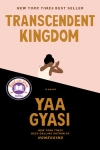Transcendent Kingdom tells the story of Gifty, a struggling PHD candidate with Ghanaian roots. With great precision and care, Yaa Gyasi traces the pain of her protagonist back to a childhood shaken by her family’s experiences with racism, drug addiction and depression.
By Emily Lüter
After her blazing debut novel Homegoing, Yaa Gyasi moves from a historical novel of great scope to an intense psychological portrait of her protagonist Gifty, who is haunted by her family trauma in Transcendent Kingdom. As a PHD candidate at Stanford, Gifty not only searches for the neural pathways of reward-seeking behaviour that allow depression and addiction, but also for the reason for her family’s suffering. Her aim is to know the unknowable, the mechanisms of pain in a transcended species, as the title suggests. Homo sapiens, the most complex creature in the animal kingdom according to Gifty’s biology teacher, is the only species which believes to have overcome its designated place in evolution. Gifty makes it her aim to uncover the secrets of its brain, hoping it will help her come to terms with the emotional burden of her family history.
The Suffering of a Child
Gifty, the child of a Ghanaian immigrant family living in Huntsville, Alabama, is taught what loss and grief mean at a young age. Humiliated by the ever-present racism in the US, her father soon immigrates back to Ghana and the family has to learn to be three rather than four: Gifty, her mother and her brother Nana. For a short period, Nana manages to escape the reality of living in a hostile community when he rises as a star athlete and is cheered by people willing to forget about his skin colour as long as he wins. An injury, however, leaves him addicted to painkillers and then, when they cease to make him feel anything, heroin. He dies of an overdose. Only Gifty seems to defy her fate and goes on to study Natural Sciences at Harvard and Stanford where she replaces the evangelical religion of her childhood with scientific zeal. But even her intellectual brilliance is only seen in racist terms: the perfect immigrant story. Gifty’s life is ruptured again when her mother, suffering from depression after Nana’s death, comes to stay with her. The novel, told by her own fierce voice, dissects her feelings and thoughts as she struggles to make sense of the suffering around and inside her.
Whilst her mother holds on ever more fiercely to her evangelical belief when nothing in her life is stable, Gifty must soon realise that the First Assemblies of God church in their Huntsville neighbourhood is entrenched in systematic racism. When the truth about Nana’s addiction reaches the congregation, neither mercy nor forgiveness await the family. Instead, the children experience their community’s contempt. People of colour are preconditioned to abuse drugs and succumb to criminality is the doctrine the church preaches now, thereby enforcing Gifty’s feeling of shame. But she is a determined, strong-willed child and so she proudly turns away from this church, which does not welcome her skin colour, refusing to believe in a God who does not protect her people. Instead she turns to the hard sciences as a new way of understanding the world and working through her shame and trauma:
I’d started this work not because I wanted to help people but because it seemed like the hardest thing you could do, and I wanted to do the hardest thing. I wanted to flay any mental weakness off my body like fascia from muscle.
The Search for Meaning
With scientific precision, Gifty analyses the trauma of her family. The psychological experiments she learns about over the course of her studies fail to help her grasp the loss of her brother and the almost-loss of her mother. Even though she has turned her back on the church and her belief, she only manages to grapple with the How of addiction and depression through science, not the Why. As a neuroscientist, Gifty is trained to observe, a skill she applies to past situations as she searches for the meaning of her brother’s drug abuse and of her mother’s pain. Again and again she recounts episodes from her childhood which she now sees as turning points. Scientific metaphors alternate with Bible quotes as Gifty seeks to find a language which captures her experiences. The conflict between science and religion is never fully solved in the novel, reflecting that such a solution would be simplistic.
Identity, memory and belief are complex and contradictory, sometimes diametrically opposed and sometimes congruently similar. The psychological depth of Gifty’s inner world allows the story to bring religion and science together where they would traditionally clash. It is not about debating which one of the two is better or truer. It is about an individual’s struggle to find meaning in a life so shaken by trauma:
I used to see the world through a God lens and when that lens clouded, I turned to science. Both became, for me, valuable ways of seeing, but both have failed to fully satisfy their aim: to make clear, to make meaning.
Mother and Daughter
The novel is as much about Gifty as it is about Gifty’s mother. With anthropological precision, her daughter tries to document her mother’s depression. She records slight changes in her behaviour and draws hope from the slightest signals. It is her way of coping with something she cannot know. As a child she used to pray for her mother’s »sadness«, now she applies her scientific knowledge to understand it as an illness. The mother-daughter relationship is strained and tenses as Gifty feels increasingly separated from the woman she hardly recognizes as her mother at all. She realizes over time that her understanding of her mother’s identity is inevitably linked to their relation to one another as mother and child. The character itself only appears as »mother« in the novel and is not given an individual name as if she only existed in her function as parent. An inner struggle ensues as Gifty has to come to terms with the fact that her mother is a person of her own – unknowable and separate from her. Even though she does not die like Nana, this realization is almost as great a loss:
Of course, my mother is her own person. Of course she contains multitudes… I forget this and relearn it anew because it’s a lesson that doesn’t, that can’t, stick. I know her only as she is defined against me, in her role as my mother, so when I see her as herself… there’s dissonance.
Past and Present
There is a distancing quality to the narrative style, an aloofness of the narrator. Gifty hints at episodes in her life on which she chooses not to elaborate and feelings she hides from herself. Her affairs with women and occasional boyfriends, for example, are only mentioned fleetingly, almost as an afterthought. This, however, is also a clever way of focusing on Gifty as a character herself. She does not make her life about other men and women but instead about her unique thoughts and feelings. Her homodiegetic narrative paints a complex, nuanced psychological picture with Gifty at the centre.

Yaa Gyasi
Transcendent Kingdom
Knopf: New York 2020
288 pages, $27.95
Time is not linear in this story; the present is informed by the past and the past is shaped and interpreted in terms of the present. The novel moves with little progress, jumping back and forth in time, reminiscing. It mirrors the slow changes in Gifty’s mother’s depression and her own circular thought processes. Mental health issues and addiction cannot be captured by a clear-cut exposition, climax and denouement. Life does not always conform to novelistic rules. The narrated time stretches and contracts as the depressed sleeps and as her daughter waits for her to wake up like »Lazarus from the dead«.
In Transcendent Kingdom, Gyasi masters a wealth of topics without losing nuance and depth. She holds all the strands of the narrative together as her protagonist struggles through questions of faith, science, family bonds, growing-up, racism, and pain. Not only does the novel explore the life of an immigrant girl, it also reveals a greater truth about suffering which is universal to the human species. The search for meaning in loss remains one of the hardest quests and will never find a definite answer.






